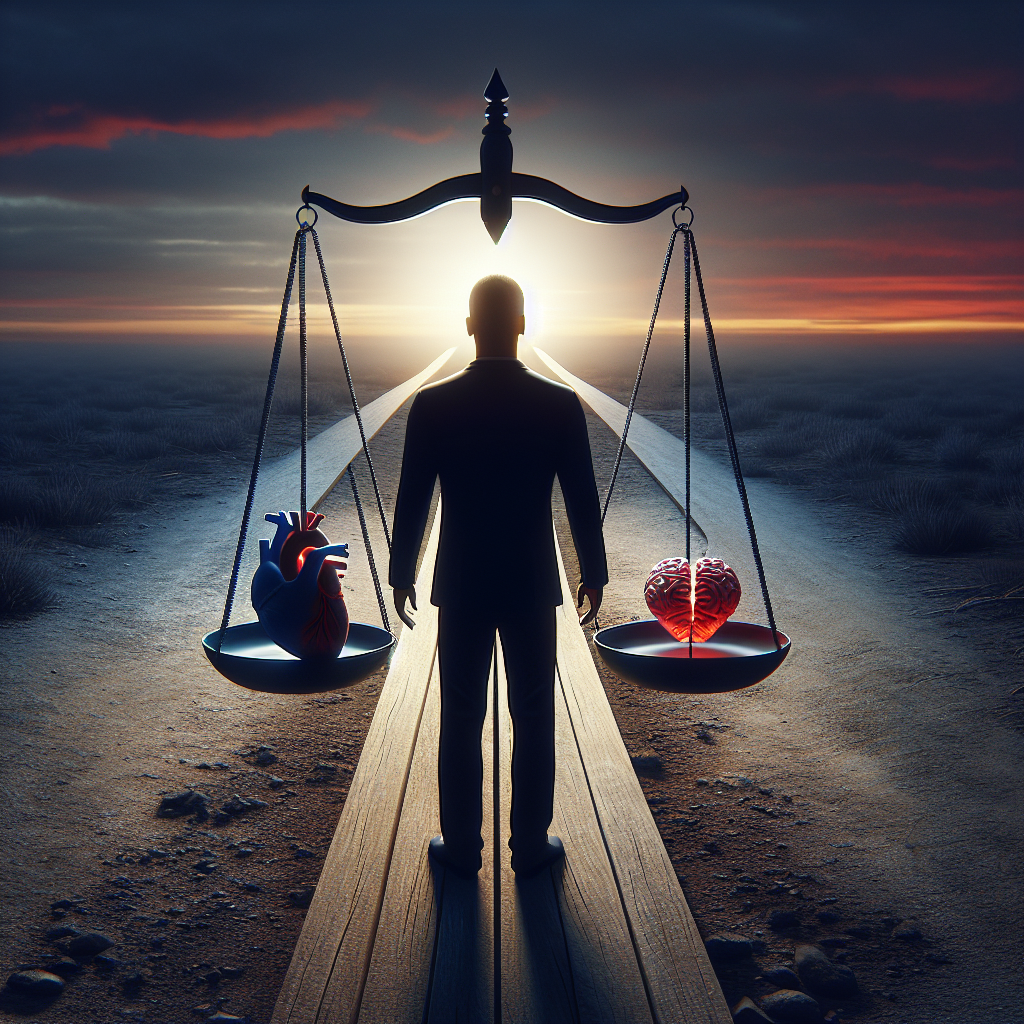In today’s fast-paced and interconnected world, it is essential to recognize the significance of personal responsibility as a key holistic principle. By embodying personal responsibility, you take ownership of your actions, thoughts, and emotions, fostering a positive and fulfilling life journey. This fundamental principle empowers you to prioritize self-care, make informed decisions, and cultivate healthy relationships. By understanding the importance of personal responsibility, you embark on a transformative path towards self-awareness, growth, and ultimately, a more balanced and harmonious existence.
Understanding Personal Responsibility
Defining personal responsibility
Personal responsibility refers to the idea that you have the ability and duty to make choices and take actions that align with your values, goals, and obligations. It is the understanding that you are responsible for your own life, decisions, and the consequences that arise from them. It involves acknowledging that you have control over your own thoughts, feelings, and actions, and that you are accountable for the outcomes that result from them.
The importance of personal responsibility in personal growth
Personal responsibility plays a crucial role in personal growth. By taking ownership of your actions and choices, you empower yourself to grow and develop as an individual. It allows you to reflect on your own behavior, learn from your mistakes, and make positive changes. Personal responsibility cultivates self-awareness, motivation, and resilience, which are essential qualities for personal growth and self-improvement.
The role of personal responsibility in holistic well-being
Holistic well-being encompasses various aspects of a person’s life, including their physical, mental, emotional, and social well-being. Personal responsibility is a key principle in achieving holistic well-being because it empowers you to prioritize and take care of all these areas. By taking responsibility for your health, relationships, career, finances, and more, you can create a balanced and fulfilling life. Personal responsibility allows you to actively participate in your own well-being and make choices that promote overall happiness and satisfaction.
Personal Responsibility and Self-Awareness
Developing self-awareness through personal responsibility
Personal responsibility requires a deep level of self-awareness. By taking responsibility for your thoughts, beliefs, and actions, you become more conscious of your own patterns and behaviors. This awareness allows you to identify areas for growth and improvement. By embracing personal responsibility, you enhance your ability to understand yourself better, recognize your strengths and weaknesses, and make choices that align with your values and goals.
Recognizing and owning one’s actions and choices
Taking personal responsibility involves acknowledging and accepting the consequences of your actions and choices. It means not shifting blame onto others or external circumstances, but rather looking inward and recognizing your role in a situation. By taking ownership of your actions, you foster a sense of integrity and accountability. This allows you to learn from your mistakes, make amends when necessary, and make more informed choices in the future.
Taking accountability for one’s emotions and reactions
Personal responsibility extends to how we handle our emotions and reactions. It means recognizing that we have control over how we respond to challenging situations and taking ownership of our emotional well-being. By accepting responsibility for our emotions, we can better manage them, develop healthy coping mechanisms, and cultivate emotional resilience. This empowers us to navigate life’s ups and downs with a sense of control and understanding.

Personal Responsibility and Goal Setting
Setting meaningful and achievable goals
Personal responsibility is essential when it comes to goal setting. It involves taking the initiative to identify and set meaningful, realistic, and attainable goals. By taking responsibility for your goals, you are more likely to stay committed, motivated, and focused on their achievement. It allows you to define what success means to you and take the necessary steps to make it a reality.
Taking proactive steps towards goal attainment
Beyond merely setting goals, personal responsibility means taking proactive steps towards their realization. It involves breaking down your goals into smaller actionable tasks and consistently working towards them. By embracing personal responsibility, you recognize that your goals require effort, dedication, and perseverance. Taking ownership of your actions and progress allows you to make consistent progress and overcome obstacles along the way.
Embracing personal responsibility for goal outcomes
Personal responsibility entails accepting that the outcome of your goals is ultimately in your hands. While external factors may come into play, taking ownership of the results empowers you to take action and adapt accordingly. Rather than blaming external circumstances for not achieving your goals, personal responsibility allows you to learn from setbacks, adjust your approach, and create new strategies. It enables you to embrace a growth mindset and embody the resilience needed to achieve your desired outcomes.
Personal Responsibility and Relationships
Nurturing healthy and respectful connections
Personal responsibility is imperative in building and maintaining healthy relationships. It involves recognizing that you play a crucial role in fostering positive connections with others. By taking responsibility for your own actions, attitudes, and communication, you contribute to creating a nurturing and respectful environment in your relationships. It means treating others with kindness, empathy, and respect and holding yourself accountable for your behavior towards them.
Communicating openly and honestly
Personal responsibility requires open and honest communication in relationships. It involves expressing your thoughts, feelings, and needs effectively, while also actively listening to others. By taking responsibility for your communication, you create a space for understanding, trust, and vulnerability in your relationships. It allows for the resolution of conflicts, the strengthening of emotional bonds, and the fostering of meaningful connections.
Taking responsibility for one’s role in conflicts
Conflicts are a natural part of any relationship, but personal responsibility allows you to approach them with maturity and accountability. It involves recognizing your contribution to conflicts and taking ownership of your part in them. By reflecting on your actions, biases, and reactions, you can learn from conflicts and make necessary changes. Personal responsibility enables you to navigate conflicts in a respectful and constructive manner, leading to healthier and more harmonious relationships.

Personal Responsibility and Emotional Well-being
Managing and regulating emotions
Personal responsibility entails actively managing and regulating your emotions. It means understanding that you have control over how you respond to different emotional triggers and taking responsibility for your emotional well-being. By developing emotional intelligence and self-awareness, you can cultivate healthier emotional responses, reduce stress, and improve overall well-being.
Accepting personal responsibility for emotional reactions
Rather than blaming external circumstances or others for your emotional state, personal responsibility involves accepting that your emotional reactions are your own responsibility. It means acknowledging that you have the power to choose how you respond and taking accountability for the impact your emotions have on yourself and others. By embracing personal responsibility for your emotions, you can foster healthier relationships, improve communication, and cultivate emotional resilience.
Practicing self-care and self-reflection
Personal responsibility includes prioritizing self-care and engaging in self-reflection. It involves recognizing that your well-being is your own responsibility and making choices that promote self-nurturing and growth. By taking care of your physical and mental health, practicing self-compassion, and setting boundaries, you empower yourself to lead a fulfilling and balanced life. Personal responsibility encourages you to prioritize self-reflection, introspection, and personal development, leading to greater self-awareness and overall well-being.
Personal Responsibility and Work/Career
Striving for excellence and growth
Personal responsibility is vital in the context of work and career development. It involves taking ownership of your professional growth and striving for excellence in your work. By recognizing that your career progression is within your control, you become proactive in seeking opportunities for learning, skill development, and advancement. Personal responsibility allows you to set high standards, take initiative, and continuously improve in your chosen field.
Taking ownership of professional development
Personal responsibility means taking ownership of your professional development. It involves actively seeking opportunities for growth, such as attending workshops, networking, and acquiring new skills. By embracing personal responsibility for your professional development, you enhance your marketability, increase your knowledge, and open doors to new opportunities. It empowers you to shape your career path and take control of your professional success.
Accepting responsibility for job performance
Personal responsibility means accepting that you are accountable for your job performance. It involves being proactive in meeting deadlines, delivering quality work, and fulfilling your responsibilities. By taking ownership of your job performance, you demonstrate reliability, professionalism, and a commitment to excellence. Personal responsibility allows you to take pride in your work, contribute effectively to your organization, and build a reputation for dependability and success.
Personal Responsibility and Physical Health
Prioritizing physical well-being
Personal responsibility involves prioritizing your physical health. It means recognizing that your well-being is your own responsibility and making choices that support a healthy lifestyle. By adopting a balanced diet, engaging in regular exercise, and getting sufficient rest, you invest in your physical well-being. Personal responsibility empowers you to take control of your health, reduce the risk of illnesses, and enhance your overall quality of life.
Adopting healthy habits and lifestyle choices
Taking personal responsibility for your physical health requires adopting healthy habits and lifestyle choices. It involves making informed decisions about nutrition, exercise, sleep, and stress management. By embracing personal responsibility, you choose behaviors that support your physical well-being, such as quitting smoking, reducing alcohol consumption, and practicing safe sex. Personal responsibility enables you to lead a healthier and more vibrant life.
Taking responsibility for one’s health outcomes
Personal responsibility includes accepting that the outcomes of your health are within your control. It involves recognizing that your habits, choices, and behaviors directly impact your health. By taking ownership of your health outcomes, you become proactive in prevention, early detection, and effective management of health conditions. Personal responsibility empowers you to make informed decisions about your health and take the necessary steps to lead a fulfilling and active life.
Personal Responsibility and Mental Health
Seeking help and support when needed
Personal responsibility involves recognizing when you need help and actively seeking support for your mental well-being. It means understanding that it is okay to reach out to mental health professionals, counselors, or support groups when facing challenges. By embracing personal responsibility, you break the stigma surrounding mental health and prioritize your emotional well-being. It empowers you to take control of your mental health journey and seek the necessary resources for support and healing.
Engaging in proactive mental health practices
Taking personal responsibility for your mental health requires engaging in proactive practices that promote well-being. It involves incorporating activities such as mindfulness, meditation, and self-reflection into your daily routine. By embracing personal responsibility, you cultivate resilience, manage stress, and enhance your overall mental well-being. Personal responsibility enables you to develop coping mechanisms and establish healthier patterns of thinking, leading to increased happiness and fulfillment.
Acknowledging personal responsibility for mental well-being
Personal responsibility includes acknowledging that you are accountable for your mental well-being. It involves recognizing that your thoughts, beliefs, and attitudes significantly influence your emotional state. By taking ownership of your mental well-being, you empower yourself to challenge negative thought patterns, seek positive experiences, and adopt a more optimistic mindset. Personal responsibility allows you to take an active role in maintaining mental wellness, leading to greater emotional stability and a higher overall quality of life.
Personal Responsibility and Financial Stability
Making informed financial decisions
Personal responsibility entails making informed decisions about your finances. It involves understanding your financial situation, setting realistic goals, and making choices that align with your long-term financial stability. By embracing personal responsibility, you recognize the importance of budgeting, saving, and investing wisely. It empowers you to make conscious financial decisions, avoid unnecessary debt, and work towards achieving financial security.
Budgeting and managing personal finances
Taking personal responsibility for your financial stability includes budgeting and effectively managing your personal finances. It involves tracking your income, expenses, and savings, and ensuring that you live within your means. By embracing personal responsibility, you develop financial discipline, avoid impulsive spending, and take control of your financial future. Personal responsibility enables you to plan for the unexpected, reduce financial stress, and create a solid foundation for long-term financial well-being.
Taking accountability for financial success
Personal responsibility means accepting accountability for your financial success or struggles. It involves recognizing that your actions and choices have a direct impact on your financial well-being. By embracing personal responsibility, you eliminate the blame game and take proactive steps to improve your financial situation. It empowers you to seek financial education, make necessary adjustments, and work towards achieving your financial goals. Personal responsibility allows you to create a more secure and prosperous financial future.
Personal Responsibility and Community Involvement
Contributing to the well-being of the community
Personal responsibility extends beyond oneself to the broader community. It involves recognizing your role in making a positive impact and contributing to the well-being of society. By embracing personal responsibility, you actively seek ways to give back and support others through volunteering, charitable donations, or advocacy work. It empowers you to become an agent of change and work towards a better and more inclusive world.
Acting ethically and responsibly in society
Taking personal responsibility includes acting ethically and responsibly in society. It involves making choices that uphold moral standards, respect diversity, and promote social justice. By embracing personal responsibility, you engage in fair and unbiased practices, treat others with kindness and respect, and strive to make a positive difference in the lives of those around you. Personal responsibility allows you to become an ethical and responsible citizen, contributing to the greater good of your community.
Making a positive impact through personal responsibility
Personal responsibility enables you to make a positive impact on society through your actions, choices, and behaviors. It involves recognizing that even small acts of kindness and responsibility can create a ripple effect that transforms communities. By embracing personal responsibility, you inspire others to do the same, fostering a culture of personal accountability and collective well-being. Personal responsibility allows you to leave a lasting legacy of positive change and influence in your community.
In conclusion, personal responsibility is a key holistic principle that encompasses various aspects of life. From personal growth to well-being in relationships, work, health, and community involvement, personal responsibility empowers individuals to take ownership of their choices, actions, and outcomes. By embracing personal responsibility, you cultivate self-awareness, develop valuable skills, and create a life that is aligned with your values, goals, and obligations. Personal responsibility is a fundamental pillar in achieving holistic well-being and creating a positive and meaningful impact on both your own life and the world around you. So, embrace personal responsibility today and unlock your potential for growth, success, and happiness.

